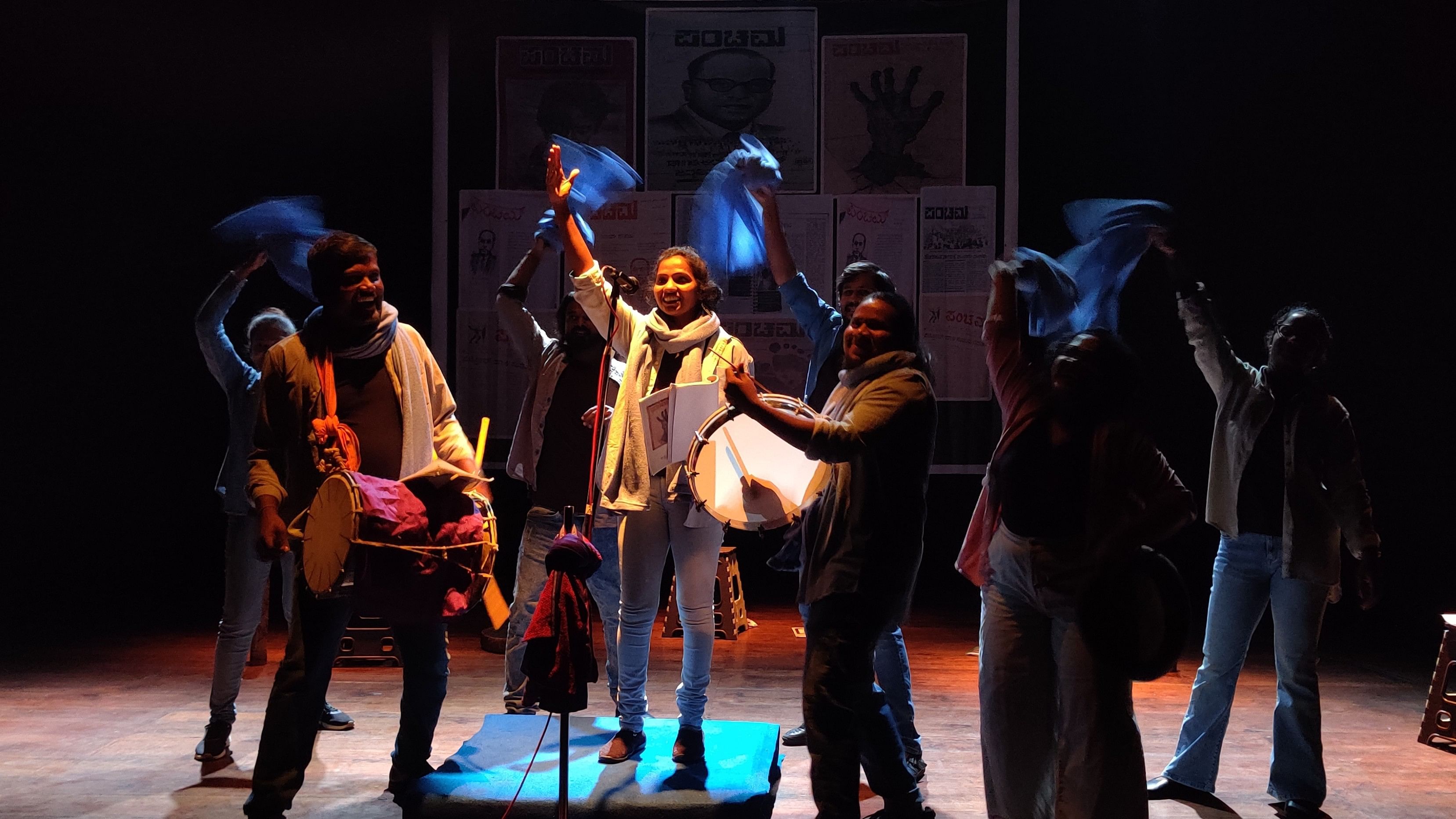
The Bengaluru-based group Jangama Collective is taking ‘Panchama Pada’, a theatrical narration of Karnataka’s Dalit movement, to cities across India.
The play is based on articles and letters published in Panchama, a magazine dedicated to Dalit concerns. Among other things, it published songs of resistance during the Dalit movement of the early 1970s in Karnataka.
This narration uses ‘horatada haadugalu’ (songs of resistance), by Dalit writers such as K B Siddaiah, Siddalingaiah, R Manasaiah and Kotiganahalli Ramaiah. It also shows how the Dalit movement and literature have grown together in Karnataka.
Drawing inspiration from real-life experiences, the all-Dalit cast includes Uma Y G, Narasimharaju B K, Shraddha Raj H R, Shweta H K, Mariyamma, and Bharat Dingri.
At a show last week at Ranga Shankara, Bengaluru, the group delivered a powerful performance. Director K Chandrasekhar and designer Lakshman K P also played integral roles in shaping the narrative. The soundscape resonated with the history of the Dalit movement, with the traditional drums ‘tamate’ and the ‘arai’ filling the stage with their vibrant energy.
The play opened with a harrowing tableau of atrocities that took place in Hunasikatte in Kolar district and Dasanapura in Tumkur district, where Dalits were brutally assaulted and murdered. Dalit singer Banandur Kempaiah’s heart wrenching account of the ‘Janivara incident’, (in which a ‘sacred thread’ he was wearing was wrenched off), was also part of the narrative. All these incidents had been documented in Panchama.
The narration also weaves in Kotiganahalli Ramaiah’s daughter Disha’s note on the importance of gender sensitivity in tackling the Hunasikatte incident, where a woman was gang raped. This added a deeper layer of understanding to the ongoing struggle for equality. Dalit writer H Govindaiah’s poem ‘A Letter to Father’ also blended in.
The spirit of the resistance songs shone throughout the play. A song penned by Ramaiah in response to the Kolar incident, and K B Siddaiah’s ‘Ee nada manninalli’ (On this soil), against the backdrop of the tragic killing of Chikkathimmayya (in Dasanapura), ignited a sense of defiance and unity.
The play showcases the impact of the Dalit movement beyond the atrocities on Dalits. It sheds light on the broader fight for equality for all marginalised communities.
The brutal gang rape of a woman from the potter community in Kolar’s Hunasikatte in 1979, and the subsequent killing of her father sparked outrage and triggered the Dalit movement. This incident, along with countless others, prompted the movement’s unwavering commitment to challenging oppression in all forms.
The play starts with humour, engaging viewers disarmingly, before it abruptly shifts gears. At the last show, the stage erupted with serious questions, with the performers demanding immediate answers from the audience. For some in the audience, the experience was unsettling, forcing them to confront uncomfortable truths.
The players invited members of the audience to share their personal stories on stage. This open invitation added a layer of interactivity and vulnerability, blurring the lines between performers and the audience.
This work by Jangama Collective stands out like a thunderclap in an era of stand-up shows. Compared to the Chennai-based music band, ‘The Casteless Collective’ by Pa Ranjith, this narration takes a sharper, rawer approach.
Unafraid to tackle systemic issues head-on, the performance is marked by biting satire and poignant lyrics.
The true power of ‘Panchama Pada’ is the ability to provoke dialogue and ultimately prompt self-examination. It doesn’t offer easy answers, but asks what role we can play in dismantling social injustice.
(The writer is a Kannada author and teaches journalism)